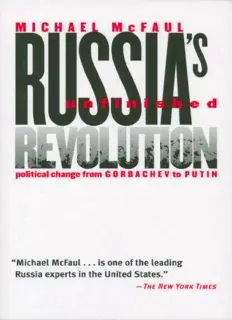
Russia's Unfinished Revolution: Political Change from Gorbachev to Putin PDF
Preview Russia's Unfinished Revolution: Political Change from Gorbachev to Putin
Russia's Unfinished Revolution Russia's Unfinished Revolution Political Change from Gorbachev to Putin MICHAEL McFAUL CORNELL UNIVERSITY PRESS Ithaca and London Copyright © 2001 by Cornell University All rights reserved. Except for brief quotations in a review, this book, or parts thereof, must not be reproduced in any form without permission in writing from the publisher. For information, address Cornell University Press, Sage House, 512 East State Street, Ithaca, New York 14850. First published 2001 by Cornell University Press First printing, Cornell Paperbacks, 2002 Printed in the United States of America Library of Congress Cataloging-in-Publication Data McFaul, Michael, b. 1963 Russia's unfinished revolution : political change from Gorbachev to Putin / Michael Anthony McFaul. p. cm. Includes bibliographical references and index. ISBN-13: 978-0-8014-3900-1 (cloth : alk. paper) ISBN-13: 978-0-8014-8814-6 (pbk. : alk. paper) 1. Russia (Federation)-Politics and government- 1991-. 2. Soviet Union-Politics and government- 1985-1991. 3. Democracy-Russia (Federation) 4. Democracy-Soviet Union. I. Title. DK510·763 .M384 2001 320.947-dc21 2001001667 Cornell University Press strives to use environmentally re sponsible suppliers and materials to the fullest extent possible in the publishing of its books. Such materials include vegetable-based, low-VOC inks and acid-free papers that are recycled, totally chlorine-free, or partly composed of non wood fibers. For further information, visit our website at www.com ellpress.cornell.edu. Cloth printing 10 9 8 7 6 5 4 3 Paperback printing 10 9 8 7 6 5 4 3 For my parents, Kip and Helen McFaul Contents Preface IX Acknowledgments xiii 1. The Revolutionary Transition from Communism to Democracy: A Model 1 PART 1. THE GORBACHEV ERA, 1985-1991 2. Gorbachev's Design for Reforming Soviet Political Institutions 33 3· The End of the Soviet Union 61 PART 2. THE FIRST RUSSIAN REpUBLIC, 1991-1993 4· Institutional Design in the First Russian Republic 121 5· The Failure of the First Russian Republic 161 PART 3. THE EMERGENCE OF THE SECOND RUSSIAN REpUBLIC, 1993-1996 6. Designing the Political Institutions of the Second Republic 207 7· Transitional Constitutionalism 228 8. Transitional Electoralism 265 vii CONTENTS PART IV. THE FUTURE OF RUSSIAN DEMOCRACY g. The Quality of Russian Democracy 10. The Stability of Partial Democracy Index 373 vm Preface In the spring of 1988, I traveled to Moscow to do some final interviews for my dissertation on revolutions in southern Africa. Because I was espe cially concerned with international influences on revolutionary processes, I wanted to meet Soviet scholars working on the same subject. My visit to the Institute of Mrican Studies that spring was mostly a bust. KGB agents disguised as senior researchers were not that revealing about their activi ties in fomenting revolution in Angola, Zimbabwe, or South Africa. They also were wary of my motives, believing of course that I worked for the same kind of agency that they did. One real scholar at the Institute, Tanya Krasnopevtsova, took my research interests seriously. Away from the op pressive confines of the Institute and in the safer space provided by a park bench at Patriarch's Pond, Tanya explained to me what the Soviet Union was really up to in southern Africa. When she finally figured out that my dissertation was about revolutions, she scoffed at my case selection. ''Why study Angola when a revolution is under way right here in the largest coun try in the world?" My chance encounter with Tanya Krasnopevtsova that spring had huge consequences for the path that my research and life interests would take. She introduced me to two scruffy, crazed, romantic revolutionaries, Yuri Skubko and Viktor Kuzin. At the time, both were busy forming the first noncommunist party in the Soviet Union, the Democratic Union. The prin ciples guiding their formation of this party included elimination of the cult of Lenin and creation of a multiparty democracy-ideas radical if not down right naive for the times. At the time, I did not believe that these Demo cratic Union activists had any chance for success, but I was intrigued by ix
